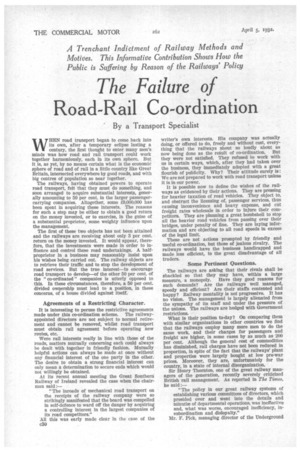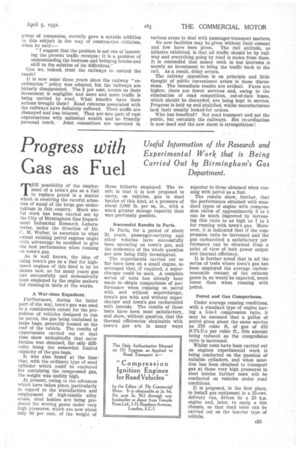The Failure of Road-Rail Co-ordination
Page 52

Page 53

If you've noticed an error in this article please click here to report it so we can fix it.
" By a Transport Specialist
WHEN road transport began to come back into its own, after a temporary eclipse lasting a century, the first thought to enter many men's minds was how road and rail transport could work together harmoniously, each in its own sphere. But it is, as yet, by no means certain what is the economic sphere of road and of rail in a little country like Great Britain, intersected everywhere by good roads, and with big centres of population so near together.
The railways, having obtained powers to operate road transport, felt that they must do something, and soon arranged to acquire substantial interests, generally amounting to 50 per cent, in the larger passengercarrying companies. Altogether, some £9,000,000 has been spent in acquiring these interests. The reasons for such a step may be either to obtain a good return on the money invested, or to exercise, in the guise of a substantial proprietor, some weighty influence upon the management.
The first of these two objects has not been attained and the railways are receiving about only 3 per cent. return on the money invested. It would appear, therefore, that the investments were made in order to influence and control these road undertakings. A halfproprietor in a business may. reasonably insist upon his wishes being carried out. The railway objects are to retrieve their traffic and to stop the development of road services. But the true interest—to encourage road transport to develop—of the other 50 per cent. of the " co-ordinated " companies is utterly opposed to this. In these circumstances, therefore, a 50 per cent, divided ownership must lead to a position, in these concerns, of a house divided against itself.
Agreements of a Restricting Character.
It is interesting to peruse the restrictive agreements made under this co-ordination scheme. The railwayappointed directors are not subject to normal retirement and cannot be removed, whilst road transport must obtain rail agreement before operating new routes, etc.
Were rail interests really in line with those of the roads, matters mutually concerning each could always be dealt with together in friendly fashion. Mutually helpful actions can always be made at once without any financial interest of the one party in the other. The desire to obtain a strong financial interest can only mean a determination to secure ends which would not willingly be obtained.
At its recent annual meeting the Great Southern Railway of Ireland revealed the case when the chairman said :—
" The inroads of mechanical road transport on the receipts of the railway company were so strikingly manifested that the board was compelled in self-defence to ward off the danger by acquiring a controlling Interest in the largest companies of its road competitors."
All this was early made clear in the case of the c30 writer's own interests. His company was actually doing, or offered to do, freely and without cost, everything that the railways shout so loudly about as now being done as the result of co-ordination. But they were not satisfied. They refused to work with us in certain ways, which, after they had taken over the business, they immediately adopted with a great flourish of publicity. Why? Their attitude surely is: We are not prepared to work with road transport unless it is in our power.
It is possible now to define the wishes of the railways as evidenced by their actions. They are pressing for heavier taxation of road vehicles. They object to, and obstruct the licensing of, passenger services, thus causing inconvenience and heavy expense, and cut freight rates wholesale in order to injure their competitors. They are planning a great bombshell to stop all the heavier road vehicles from passing over their bridges, under penalty of fine. They are laying information and are objecting to all road speeds in excess of the legal limit.
These are not actions prompted by friendly and useful co-ordination, but those of jealous rivalry. The railways would have the business handicapped and made less efficient, to the great disadvantage of all traders.
Some Pertinent Questions.
The railways are asking that their rivals shall be shackled so that they may have, within a large measure, a monopoly. Have they good reasons for such demands? Are the railways well managed, speedy and efficient? Are their staffs contented and happy? Railway mentality is not progressive. It has no vision. The management is largely alienated from the sympathy of its staff and under the pressure of the unions. The railways are hedged with Government restrictions.
What is their position to-day? On comparing them with similar organizations in other countries we find that the railways employ many more men to do the same work, and their charges for passengers and freight are higher, in some cases by as much as 200 per cent. Although the general cost of commodities has diminished, rail charges have not been reduced in proportion, in spite of the fact that the railways' plant and properties were largely bought at low pre-war prices. Moreover, they are, unfortunately for the country, in a state of internal disorganization.
Sir Henry Thornton, one of the great railway managers of the generation, recently severely criticized British rail management. As reported in The Times, he said :—
" The policy in our great railway systems of
establishing various committees of directors, which presided over and went into the details and minuthe of departmental operations, was ineffective and, what was worse, encouraged inefficiency, insubordination and disloyalty."
Mr. F. Pick, managing director of the Underground group of companies, recently gave a notable addition to this subject in the way of constructive criticism, when he said :— "I suggest that the problem is not one of lamenting the present traffic receipts; it is a problem of understanding the business and bringing brains and skill to the solution of its difficulties."
Can we, indeed, trust the railways to control the roads?
It is now some three years since the railway " coordination " policy was adopted, but the railways are bitterly disappointed. The 3 per cent, return on their investment is negligible and more and more traffic is being carried by road. What benefits have their actions brought them? Road concerns associated with the railways have definitely suffered. Their staffs are dismayed and lose interest. They are now part of vast organizations with unlimited wealth and no friendly personal touch. Joint committees are operated in various areas to deal with passenger-transport matters.
No new facilities may be given without their consent and few have been given. The rail attitude, as hitherto exhibited, is that all traffic should be by railway and everything going by road is stolen from them. It is contended that money sunk in bus interests is merely an investment to bring the traffic back to the rail. As a result, delay occurs.
The railway opposition is on principle and little thought of public convenience arises in these discussions. The immediate results are evident. Fares are higher, there are fewer services and, owing to the elimination of road competition, out-of-date buses, which should be discarded, are being kept in service, Progress is held up and stultified, whilst manufacturers lack their usually looked-for orders.
Who has benefited? Not road transport and not the public, but certainly the railways. But co-ordination is now dead and the new shout is strangulation!












































































































